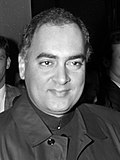24, 27 and 28 December 1984 | |||||||||||||||||||||||||||||||||||||||||||||||||||||||||||||||||||||||||||||||||||||
541 of the 543 seats in the Lok Sabha 271 seats needed for a majority | |||||||||||||||||||||||||||||||||||||||||||||||||||||||||||||||||||||||||||||||||||||
|---|---|---|---|---|---|---|---|---|---|---|---|---|---|---|---|---|---|---|---|---|---|---|---|---|---|---|---|---|---|---|---|---|---|---|---|---|---|---|---|---|---|---|---|---|---|---|---|---|---|---|---|---|---|---|---|---|---|---|---|---|---|---|---|---|---|---|---|---|---|---|---|---|---|---|---|---|---|---|---|---|---|---|---|---|---|
| Registered | 400,375,333 | ||||||||||||||||||||||||||||||||||||||||||||||||||||||||||||||||||||||||||||||||||||
| Turnout | 64.01% ( | ||||||||||||||||||||||||||||||||||||||||||||||||||||||||||||||||||||||||||||||||||||
| |||||||||||||||||||||||||||||||||||||||||||||||||||||||||||||||||||||||||||||||||||||
 Results by constituency | |||||||||||||||||||||||||||||||||||||||||||||||||||||||||||||||||||||||||||||||||||||
| |||||||||||||||||||||||||||||||||||||||||||||||||||||||||||||||||||||||||||||||||||||
 |
|---|
General elections were held in India on 24, 27 and 28 December 1984, shortly after the assassination of prime minister, Indira Gandhi. Voting was delyed in Assam and Punjab until 1985 due to ongoing insurgency.
Contents
The elections were a landslide victory for the Indian National Congress (Indira) of Rajiv Gandhi (son of Indira Gandhi), [1] which won 404 of the 514 seats elected in 1984 and a further 10 in the delayed elections. The Telugu Desam Party of N. T. Rama Rao, a regional political party from the state of Andhra Pradesh, was the second largest party, winning 30 seats, thus achieving the distinction of becoming the first regional party to become a national opposition party. AIADMK of Tamil Nadu contested the election in alliance with the INC (I), and won 12 seats. [2]
Voting was held immediately after the assassination of Indira Gandhi and the 1984 anti-Sikh riots in November. Congress (Indira) received significant support due to an outpouring of public grief at Gandhi's death. Voting was delayed in the Sikh-majority state of Punjab, while the Assam movement and sporadic violence in Mizoram by the Mizo National Front as a part of its uprising against the government saw voting being delayed in these states.
The 1984 elections were the last in which a single party won a majority of seats until 2014, and the only time to date in which a party won more than 400 seats.







